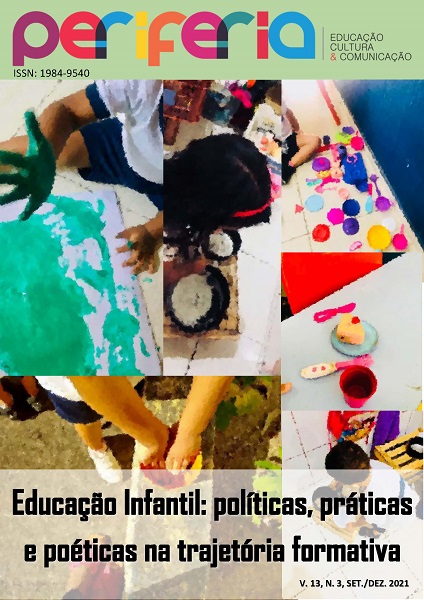O BRINCAR DO QUINTAL E DO TERREIRO: Possibilidades da BNCC para a ERER na educação infantil
DOI:
https://doi.org/10.12957/periferia.2021.63316Keywords:
Educação infantil - BNCC -Educação antirracistaAbstract
Este artigo trata-se de uma reflexão acerca da educação antirracista e tem por objetivo propor possibilidades de ações que relacionem os campos de experiências da Base Nacional Comum Curricular para educação infantil (BNCC) e a Educação para as Relações Étnico-raciais (ERER). Partiremos de um recorte etário que compreende a fase entre os 4 anos e os 5 anos e 11 meses, identificados na BNCC como crianças pequenas. A metodologia empregada foi a de análise documental da Base Nacional Comum Curricular para a educação infantil e dos apontamentos das Leis 10.639/03 e 11.645/08 para o ensino de História e Cultura Afro-brasileira e indígena na educação básica. Também foram consultados os registros e experiências docente vivenciados pela autora em turmas de educação infantil, onde atua desde o ano de 2019, na rede municipal de Niterói. Concluiu-se que a articulação entre os campos de experiências da BNCC para a educação infantil e o ensino das relações étnico raciais não só é possível como de extrema relevância na implementação de uma educação antirracista.
Downloads
Published
How to Cite
Issue
Section
License
Authors who publish in this journal agree to the following terms:
a. Authors retain the copyright and grant the journal the right of first publication, with the work simultaneously licensed under the Creative Commons Attribution License which allows the sharing of the work with acknowledgment of the authorship of the work and initial publication in this journal.
b. Authors are authorized to take additional contracts separately, for non-exclusive distribution of the version of the work published in this journal (eg, publish in institutional repository or as a book chapter), with acknowledgment of authorship and initial publication in this journal.
Authors are allowed and encouraged to publish and distribute their work online (eg in institutional repositories or on their personal page) at any point before or during the editorial process, as this can generate productive changes as well as increase the impact and the citation of the published work (See The Effect of Free Access).



